 and pens to symbolize coming up with ideas and writing a business plan." width="595" height="400" />
and pens to symbolize coming up with ideas and writing a business plan." width="595" height="400" />Years ago, I had an idea to launch a line of region-specific board games. I knew there was a market for games that celebrated local culture and heritage. I was so excited about the concept and couldn't wait to get started.
 and pens to symbolize coming up with ideas and writing a business plan." width="595" height="400" />
and pens to symbolize coming up with ideas and writing a business plan." width="595" height="400" />
But my idea never took off. Why? Because I didn‘t have a plan. I lacked direction, missed opportunities, and ultimately, the venture never got off the ground.

All fields are required.
.webp)
Click this link to access this resource at any time.
A business plan is a comprehensive document that outlines a company's goals, strategies, and financial projections. It provides a detailed description of the business, including its products or services, target market, competitive landscape, and marketing and sales strategies. The plan also includes a financial section that forecasts revenue, expenses, and cash flow, as well as a funding request if the business is seeking investment.
The business plan is an undeniably critical component to getting any company off the ground. It's key to securing financing, documenting your business model, outlining your financial projections, and turning that nugget of a business idea into a reality.
The purpose of a business plan is three-fold: It summarizes the organization’s strategy in order to execute it long term, secures financing from investors, and helps forecast future business demands.

Working on your business plan? Try using our Business Plan Template. Pre-filled with the sections a great business plan needs, the template will give aspiring entrepreneurs a feel for what a business plan is, what should be in it, and how it can be used to establish and grow a business from the ground up.
In an era where 48% of businesses survive half a decade on, having a clear, defined, and well-thought-out business plan is a crucial first step for setting up a business for long-term success.
Here’s why I think a business plan is important:
Since its contents revolve around how businesses succeed, break-even, and turn a profit, a business plan is used as a tool for sourcing capital. This document is an entrepreneur's way of showing potential investors or lenders how their capital will be put to work and how it will help the business thrive.
I’ve seen that all banks, investors, and venture capital firms will want to see a business plan before handing over their money. Therefore, these investors need to know if — and when — they‘ll be making their money back (and then some).
Additionally, they’ll want to read about the process and strategy for how the business will reach those financial goals, which is where the context provided by sales, marketing, and operations plans come into play.
I think a business plan should leave no stone unturned.
Business plans can span dozens or even hundreds of pages, affording their drafters the opportunity to explain what a business' goals are and how the business will achieve them.
To show potential investors that they've addressed every question and thought through every possible scenario, entrepreneurs should thoroughly explain their marketing, sales, and operations strategies — from acquiring a physical location for the business to explaining a tactical approach for marketing penetration.
These explanations should ultimately lead to a business' break-even point supported by a sales forecast and financial projections, with the business plan writer being able to speak to the why behind anything outlined in the plan.
I’ve seen that everyone‘s got a great idea for a company — until they put pen to paper and realize that it’s not exactly feasible.
A business plan is an aspiring entrepreneur's way to prove that a business idea is actually worth pursuing.
As entrepreneurs document their go-to-market process, capital needs, and expected return on investment, entrepreneurs likely come across a few hiccups that will make them second guess their strategies and metrics — and that's exactly what the business plan is for.
It ensures you have everything in order before bringing their business idea to the world and reassures the readers that whoever wrote the plan is serious about the idea, having put hours into thinking of the business idea, fleshing out growth tactics, and calculating financial projections.
Speaking from personal experience, there‘s a chance you’re here to get business plan ideas for your Business 101 class project.
If that's the case, might I suggest checking out this post on How to Write a Business Plan, which provides a section-by-section guide on creating your plan?
Business plans act as early warning systems that identify potential problems before they escalate into major obstacles.
How? When you conduct thorough market research, analyze competitor strategies, and evaluate financial projections, your plan pinpoints vulnerabilities and risks. This allows you to develop contingency plans and risk mitigation strategies.
This helps you prevent costly mistakes and shows investors and lenders you’re well-prepared and have considered various scenarios.
A well-articulated plan outlines your company's vision, mission, and values, showcasing a clear direction and purpose. People who want meaningful work that aligns with their ambitions will love this.
Also, it shows the company's potential for growth and stability. This instills confidence in employees and assures them of a secure future and opportunities for career advancement.
When you show growth potential and highlight a positive work culture, your business plan becomes a magnet for top talent.
A business plan provides a detailed roadmap for your company's future. It outlines your objectives, strategies, and the specific actions you need to achieve your goals.
When you define your path forward, a business plan helps you stay focused and on track, even when you face challenges or distractions. It’s a great reference tool that allows you to make smart decisions that align with your overall vision.
This way, having a comprehensive roadmap in the form of a business plan provides direction and clarity at every stage of your business journey.
A business plan is not only an internal guide but also serves as a powerful marketing tool. Your business plan can showcase your company‘s strengths, unique value proposition, and growth potential when you’re looking for investors, partnerships, or new clients.
It provides a professional and polished overview of your business, which shows your commitment and strategic thinking to potential stakeholders.
Your business plan helps you attract the right people by clearly articulating your target market, competitive advantages, and financial projections. In summary, it acts as a persuasive sales pitch.
.webp)
The essential document for starting a business -- custom built for your needs.
All fields are required.
.webp)
Click this link to access this resource at any time.
There’s no one size fits all business plan as there are several types of businesses in the market today. From startups with just one founder to historic household names that need to stay competitive, every type of business needs a business plan that’s tailored to its needs. Below are a few of the most common types of business plans.
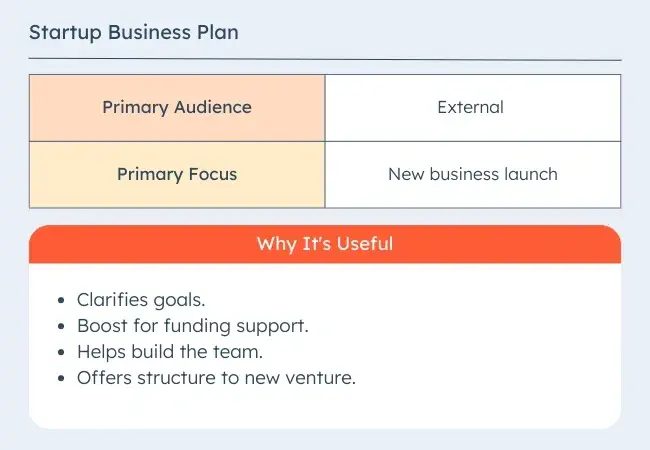
As one of the most common types of business plans, a startup business plan is for new business ideas. This plan lays the foundation for the eventual success of a business.
I think the biggest challenge with the startup business plan is that it's written completely from scratch. Startup business plans often reference existing industry data. They also explain unique business strategies and go-to-market plans.
Because startup business plans expand on an original idea, the contents will vary by the top priority goals.
For example, say a startup is looking for funding. If capital is a priority, this business plan might focus more on financial projections than marketing or company culture.
Eric Heckstall, the founder and CEO of EDH Signature Inc., which offers premier grooming products, also suggests keeping your startup business plan short.
“The traditional business plan can be 40+ pages, which is too large of a document to really be useful, can be difficult for staff to understand, and have to dig for information which most people won’t do,” Heckstall says.
Conversely, a one-to-two-page business plan improves clarity and focus. Heckstall says this format “is easy to use on a day-to-day basis, teams as well as potential investors can understand the purpose and direction of the company, and can easily be incorporated into team meetings.”
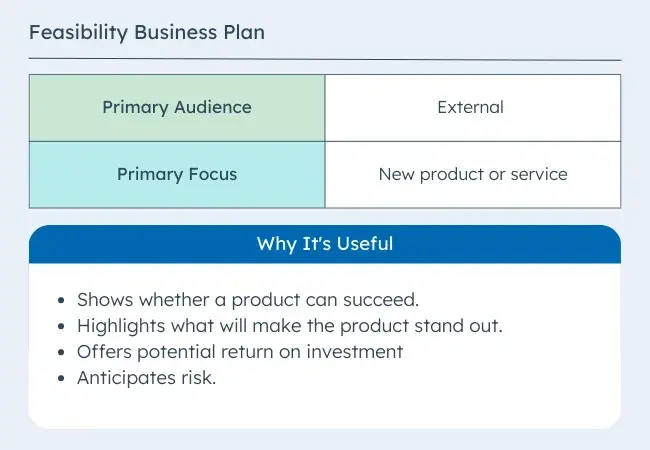
This type of business plan focuses on a single essential aspect of the business — the product or service. It may be part of a startup business plan or a standalone plan for an existing organization. This comprehensive plan may include:
Startups can fail because of a lack of market need and mistimed products. Plus, nearly half of entrepreneurs, founders, CEOs, and COOs report that price sensitivity and evolving market conditions are the number one prospect and customer challenges they face right now.
Some businesses will complete a feasibility study to explore ideas and narrow product plans to the best choice. They conduct these studies before completing the feasibility business plan. Then, the feasibility plan centers on that one product or service.
Zach Dannett, co-founder at rug company Tumble highlights how some business owners take a very idealistic approach too. And forget barriers to entry like regulatory issues in the process.
He adds how considering this aspect in their business plan helped.
Before launching the team, Dannett first took time to understand regulatory requirements in our industry, checking to make sure we needed to secure any certifications or licenses.
Then, “we reviewed financial requirements, which would cover initial investments, operational costs, and potential expenses. We then conducted thorough market research to understand our market, how saturated this market is, and identify major competitors with significant market share,” Dannett says
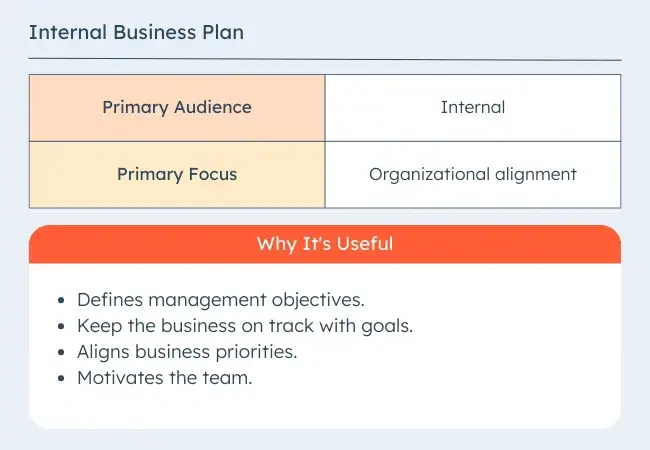
Internal business plans help leaders communicate company goals, strategy, and performance. This helps the business align and work toward objectives more effectively.
Besides the typical elements in a startup business plan, an internal business plan may also include:
Most external-facing business plans focus on raising capital and support for a business. But, an internal business plan helps keep the business mission consistent in the face of change.
You can also reduce your workload by using a free business template that helps you get a headstart on what to include.
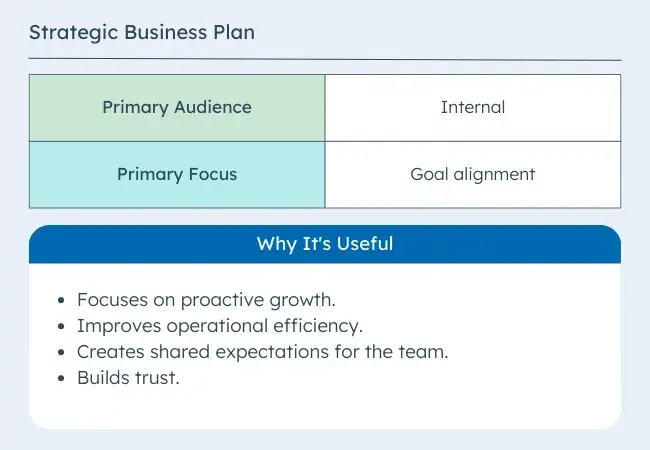
Strategic business plans focus on long-term objectives for your business. They usually cover the first three to five years of operations. This is different from the typical startup business plan which focuses on the first one to three years. The audience for this plan is also primarily internal stakeholders.
These types of business plans may include:
It's important to remember that, while many businesses create a strategic plan before launching, some business owners just jump in.
David Sides, marketing specialist at The Gori Law, highlights how it’s important not to create this plan in isolation and involve key stakeholders from across the organization in the planning process.
“We make a point of bringing together attorneys, paralegals, and support staff to discuss our long-term goals and how we can work together to achieve them. This not only helps ensure buy-in and alignment, but it also allows you to tap into a wider range of perspectives and ideas,” Sides says.
This way, the strategic business plan can add value by outlining how your business plans to reach specific goals and considering a holistic perspective from the most important stakeholders. This type of planning can also help a business anticipate future challenges.
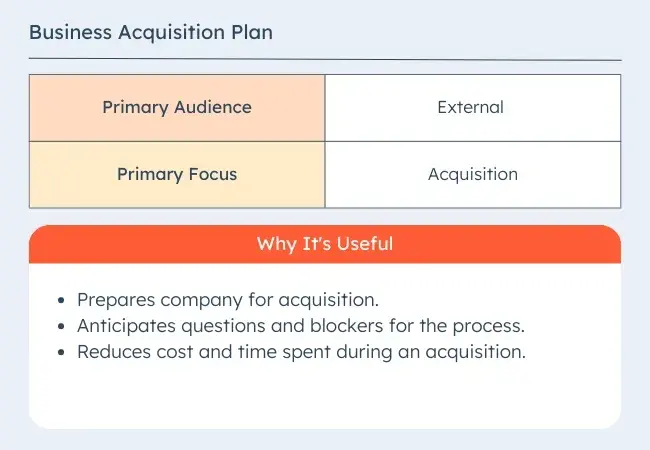
Investors use business plans to acquire existing businesses, too — not just new businesses.
I recommend including costs, schedules, or management requirements. This data will come from an acquisition strategy.
A business plan for an existing company will explain:
Ilia Tretiakov, owner and lead strategist, at So Good Digital, a marketing agency suggests adding a Day Zero Plan. This is a thorough plan outlining the steps you will take the moment the acquisition is completed.
It consists of stakeholder communication plans, critical system integration, quick operational adjustments, and cultural alignment initiatives.
.webp)
The essential document for starting a business -- custom built for your needs.